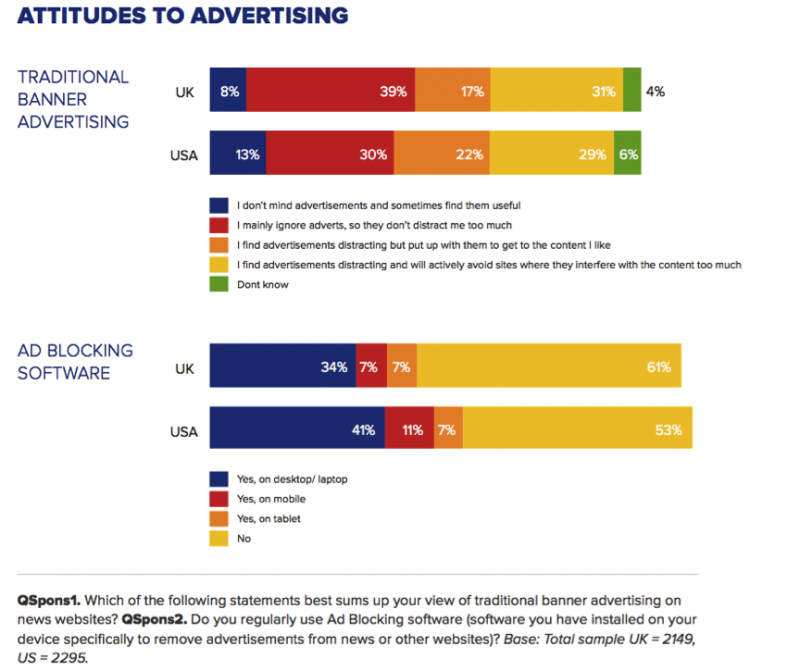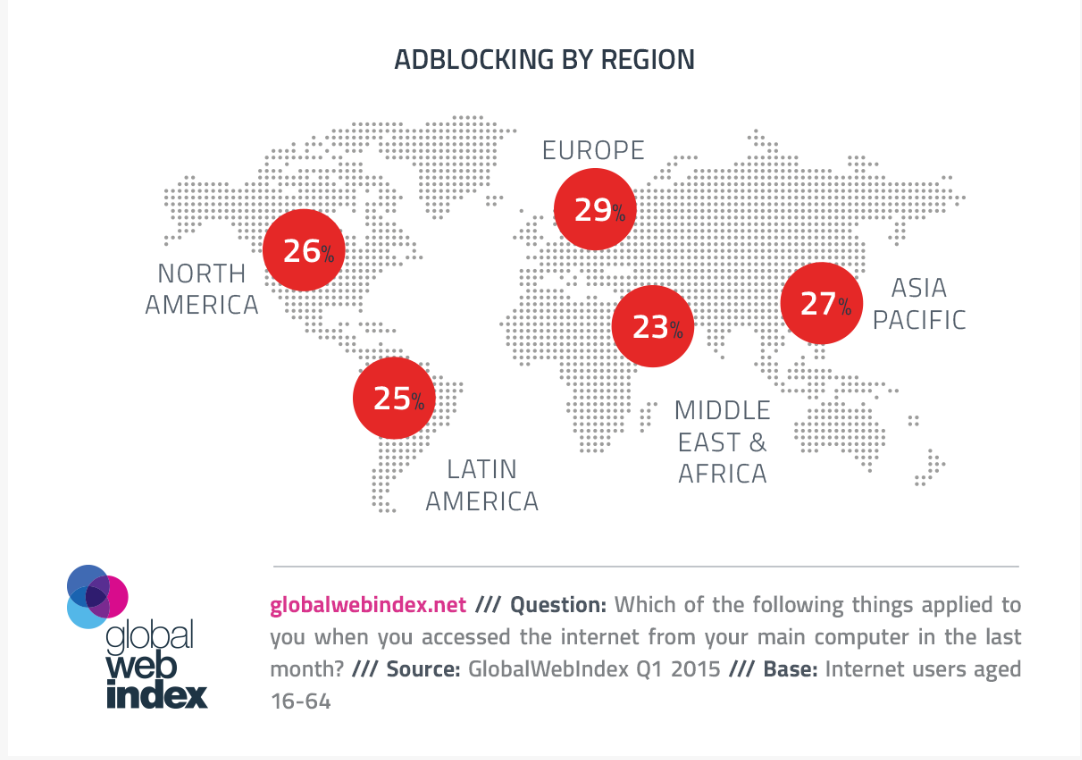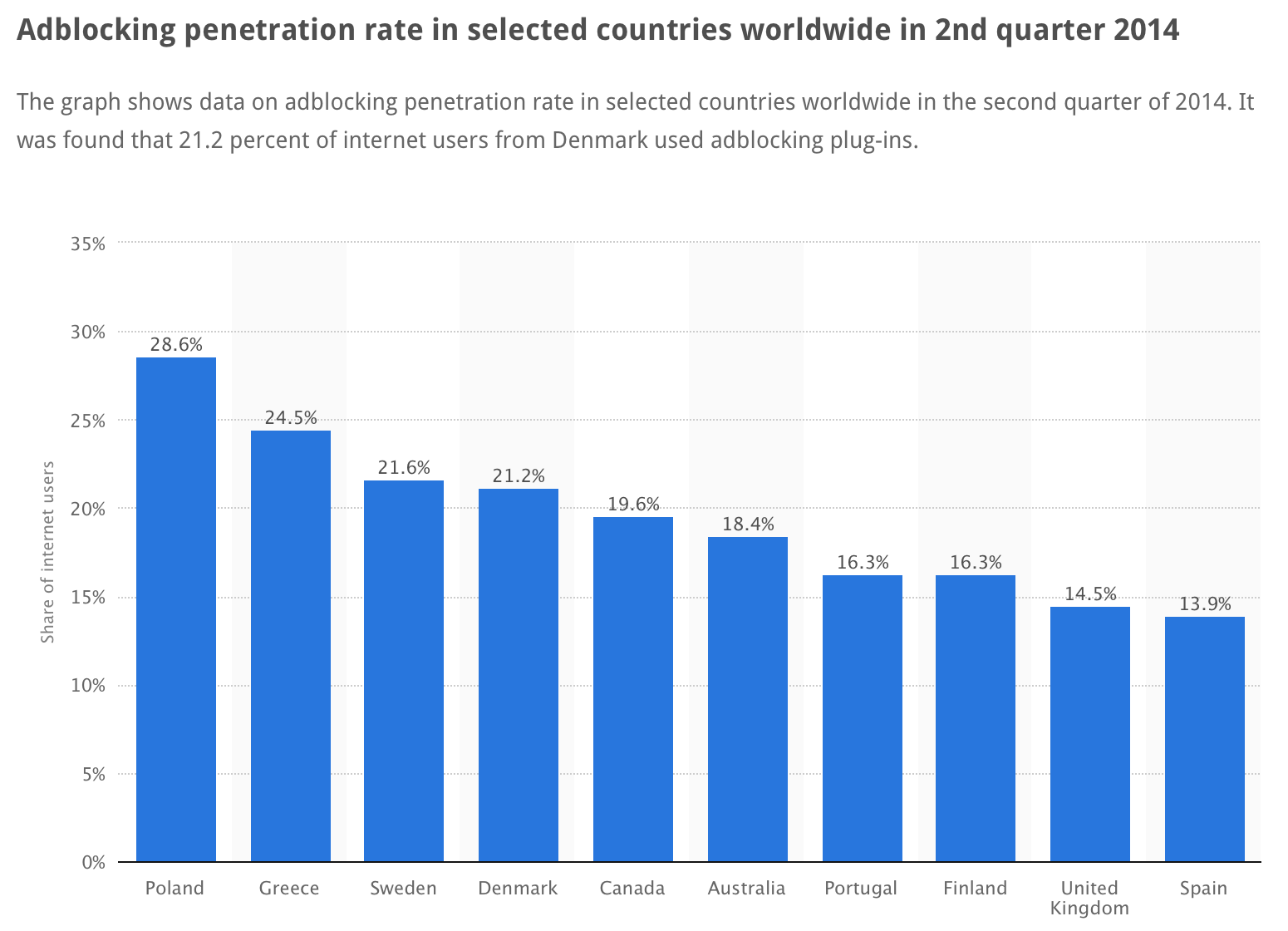The revolution is coming in blocking online advertising (Part 2)
- Transfer

With the advent of iOS 9, advertisers, website owners, and even Google itself will have a hard time.
In short : In September, the new Apple iOS 9 operating system will be released, in which revolutionary changes will occur in the advertising blocking mechanism. Innovations will have far-reaching consequences not only for websites and advertisers, but may also affect the balance in the world of mobile platforms and even Google’s revenue.
Why is that? Let's try to figure it out.
The first part is available here .
A recent Reuters survey shows that people don't like advertising. Unfortunately, the survey does not report how many people who do not block ads know about the possibility of doing this.

Attitude towards advertising and the use of ad blocking programs /
But hey, how does all this look under the prism of morality? How about the fact that sites lose revenue if you block ads?
I already wrote that these two sides are very far from each other. Ad blocking is akin to speeding: those who do this can make excuses to themselves, while those who consider this wrong are fiercely opposing such actions.
It's funny that when I tweeted how many tracking tools I managed to block using Ghostery (as part of the experiment I tried Ghostery, AdBlock, Javascript Blocker and uBlock in order to see how they affect the change in my user experience), then they started to poke my fingers right away and announced the destruction of journalism:
@GeorgeBouras @charlesarthur By blocking ads, you destroy quality media and journalism. Do not you consider yourself responsible in relation to them? - Jeff Jarvis (@jeffjarvis) July 26, 2015
Am I responsible for them? Not really. Here's what happened to me as an ordinary reader: I accepted the invitation to read the article, but I don’t think we understood each other about tracking my actions, about how numerous ad networks identify me to a particular group of users, and they ask for consent to the processing of my data and interfere with my reading experience. Does my consent to at least the last two points be necessary?
And so I answered as follows:
@jeffjarvis @GeorgeBouras I find it dangerous to think that readers should (or will) tolerate whatever advertisers like. - Charles Arthur (@charlesarthur), July 26, 2015
Full correspondence on Twitter can be seen here .
Print editions have evolved. Now it's the turn of web advertisers.
This is part of the discussion that interests me a lot (and, I admit, is fun). Print media needed to evolve and not repeat the history of dinosaurs, because the Internet was at the next stage of development: advertisers went online, and they had to follow them or die.
Now we are all connected to the Internet. And what, we must implicitly accept online advertising as it is, never shy away from it and not question it? Well, of course, that’s how we dispersed. Why should web advertisers be protected from evolutionary or revolutionary changes in user habits? Caesar's caesarean - what the print media swallowed should not be across the throat of web advertisers. I don’t remember something that the people who accused me of using blockers for advertising tracking tools claimed that everyone should return to print ads, as they bring more profit (which they still do).
Moreover, any arguments that try to build a moral dam in front of a technological river are doomed to death. Napster, Bittorrent, now we are dealing with ad blocking.
Which will quickly lead to ...
If a significant number of users move to the use of ad-blocking applications, web advertisers will have to quickly navigate to cope with the brutal reality for them. As well as online publishers.
Although, I must admit that I do not feel pity for the "publishers" of the online world. In the early days of the Internet, the Guardian had a wonderful ad that asked, “Have you ever thought about how much news appears every day, how much can you fit into a newspaper?” She advertised the Guardian website and the fact that you’ll find more news on it than it could physically fit in a newspaper.
What now? There are a huge number of sites, but most of them are just copies that are monetized by Google ads or someone else’s. They fish out all the unique content from other portals. And think about how much news appears every day: more than it could fit in the newspaper, but less than it could fill all the sites that currently consider themselves “news”. If ad blocking leads to a drop in the popularity of copies, I won’t cry. This is not journalism. This is something like terrible shorthand, even worse - shorthand is presented as journalism and on some large sites. Float quality press and decent sites. Or good journalists.
What form will this evolution take? Look at sites like Buzzfeed and how they use their own content. If a site generates ads, it’s not so easy to block. In a sense, we are returning to the country of the printed word, where we worked on content and advertising at the same time and in one place.
Ecosystem fight
Moreover, in the long run there is a potential impact. I don’t think that Apple happily thought about how to make Google muck when the company decided to open ways to block ads, but this could have tangible consequences.
Imagine: iOS 9 arrives and many iOS platform users say how happy they are to block all these annoying advertisements (Do not overestimate how quickly iOS 9 will be picked up: the system will be available even for outdated devices starting with iPhone 4S and iPad 2, and takes up less space than iOS 8. Even iOS 8 was on half of the apple devices two months after the release). Meanwhile, Android users will not be able to go the same way (hoping to achieve a similar effect). At least one of two things will happen:
- Some Android users will begin to consider switching to iPhone
- Google will have to open the ability to block ads on Google Play in order to avoid users leaving the Android platform.
Both are bad for Google. The loss of Android users in the short term is perhaps more tolerant. Ad blocking can be a global disaster for Google (which’s why it pays Adblock Plus developers not to block Google ads).
It’s unlikely that ad blocking will ever be able to reach levels that would pose a mortal danger to Google. But more and more users from developing countries come to the Internet, and, paying for every kilobyte of information, they may well want to block ads. In particular, India can already be called a technologically savvy country with a high cost of Internet traffic. And she gladly accepted Android. Imagine how this could be fraught with Google.
By the way, the Global Web Index conducted a survey related to the use of ad blocking programs. According to its results, 27% of users aged 16 to 64 years from 33 countries in which the survey was conducted use the application to block ads, and 15% block tracking of their actions.

We also have data on Europe, thanks to research from Statista:

Think about the fact that these data are unlikely to fully reflect the situation in the mobile industry. But now it is mobile platforms that are the most popular. The ability to block ads for one of the main mobile platforms will appear in September.
Suddenly, this can all be quite bleak for the advertising industry.
